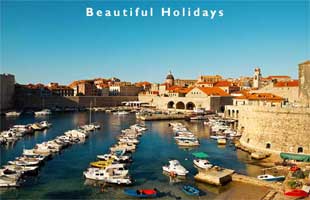European Gourmet Holiday Highlights
Beautiful Europe Holidays


France’s regions are particularly noted for their food and wine; far from the nouvelle cuisine fanciness you might associate with France, French regions are all about rustic, local foods and fine. French people can argue for hours about the merits of each area, with Brittany, Gascony, Provance and Normandy all vying for top spot. However, you might want to consider Burgandy for some quintessentially French victuals – it’s home to coq au vin, boeuf bourguignon, Beaujolias and Chardonnay. Find a homely bistro in Dijon that does all of these, and some snails to start with. Oh, and more so than anywhere else in Europe, you’ll need to speak some of the local language to find gastronomic delights.
As with France, Italy has many regional specialities. The trendiest region at the moment is Puglia – the heel of Italy’s boot. The seafood here is particularly noted, but also the bread, olives and wine. Because of the peasant origins of many of the dishes, lentil dishes and cheese are both excellent – which is worth bearing in mind if you’re a vegetarian. Tuscany in the north is also a favourite haunt of British foodies – many of Italy’s most famous sights are in this region too. Wherever you go in Italy, you’ll love the pizza, pasta and risotto.
Spain, if you can escape the tourist hordes, has some excellent food. Andalucia has sherry, gazpacho, jamon and all manner of seafood. Seek out a tapas bar in Granada or Seville to try all manner of goodies. Catalonia is excellent for food too – try some of the local cava with your seafood.
Hungary was the best place to eat out in Eastern Europe during the communist days, and the Magyars strive to keep their standards above anywhere else in the region. At its best, Hungarian cuisine blends hearty peasant tradition with elegance. Try a bottle of Bulls' Blood with a steak – with baked potatoes stuffed with crumbled bacon and butter, and the meat perched on a slice of crispy bread that's been used to soak up the juice in the pan. Or have a creamy chicken and paprika stew. Finish up with a strudel, pancakes or layered cream cake – and in Hungary, it would be rude not to have dessert with a glass of Tokaj. Remember goulash is a beef soup, rather than a stew – that's called paprikas.
Croatia is excellent for eating and drinking. At some seaside restaurants, bags of live mussels and other seafood are stored by the jetty and plucked straight out the Adriatic when ordered – they could not possibly be any fresher. Istria is particularly noted for food and wine; the Italians come here for precisely that reason. Try a glass of local sparkling wine along with some oysters, followed by some grilled fish or squid. If you're not a big seafood eater, then prsut, the local ham, is as good as any cured meat in Europe.
Belgium is a great destination for eating out. Perhaps because of the European Parliament, Brussels is stuffed with fine restaurants. Often they are quite small, however – book before you turn up!
Some restaurants offer a fixed-price menu of two or three courses, called the ‘menu del dia’ in Spain or the ‘prix fixe’ in France. These are a great way to try local specialities at a reasonable price.
There’s usually an inverse relationship between the mass of tourists in an area and food quality. If you’re out and about seeing local sights, then going anywhere that has a large sign saying “Tourist Menu” in several languages is nearly always a bad idea – if you’re not actively being ripped off, you’re certainly not going to experience European cuisine at its finest. Go a few streets away and find somewhere where at least some of the custom is local. Similarly, restaurants that employ touts to try and persuade people in are usually best avoided.
In cities, there’s nearly always an Irish pub where everyone speaks English. But try at least learning enough of the local language to be able to order drinks in a café.
It’s a great idea to stock up on some wine or spirits when you’re in Europe – particularly if you visit a shop that sells directly from the barrel, as some in France, Spain and Hungary do. But remember that not even duty free bought at your airport of origin will necessarily be allowed in your hand luggage through a hub airport later on. Pack all your foodie goodies in the suitcase that’s going in the hold.
